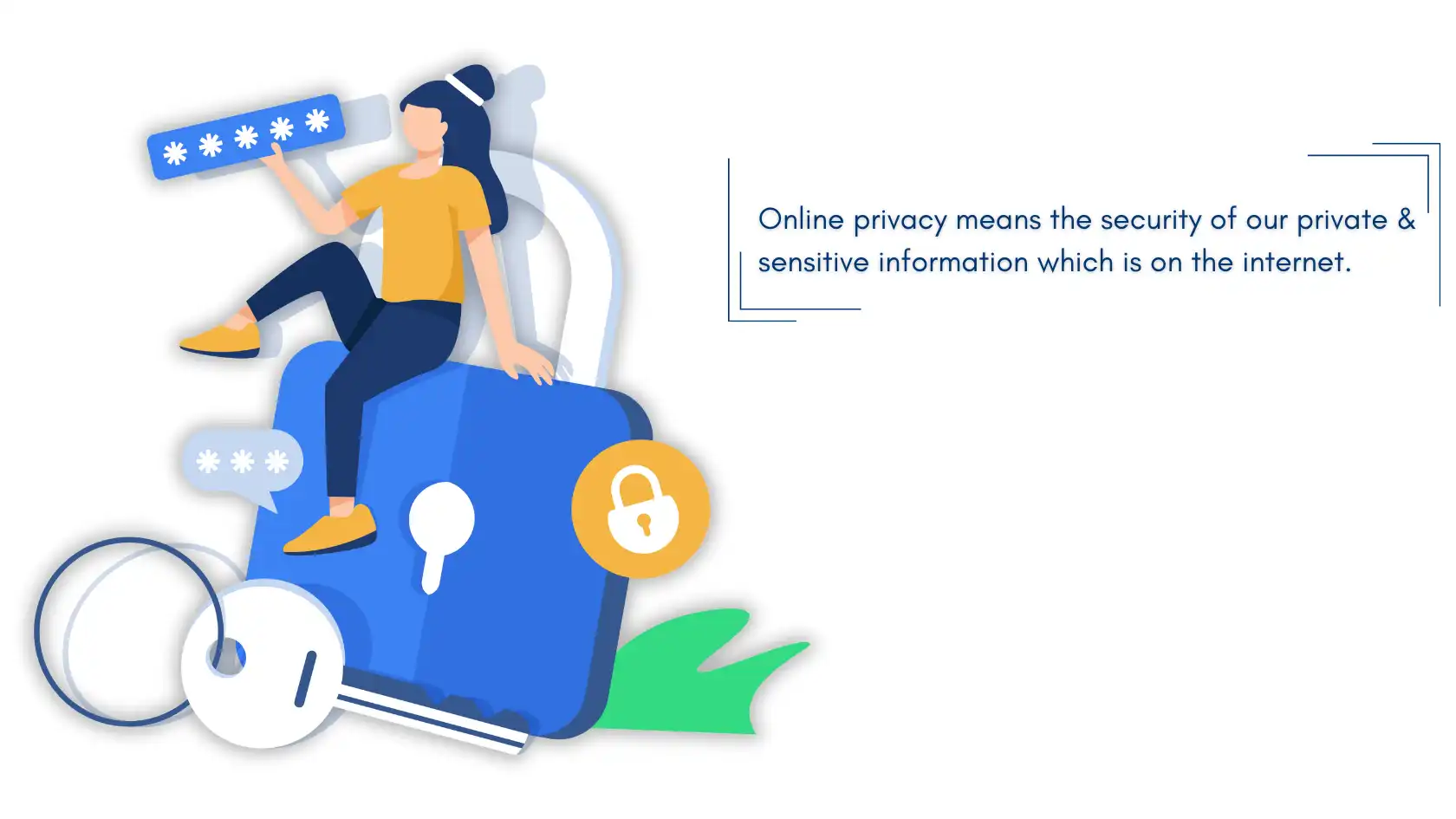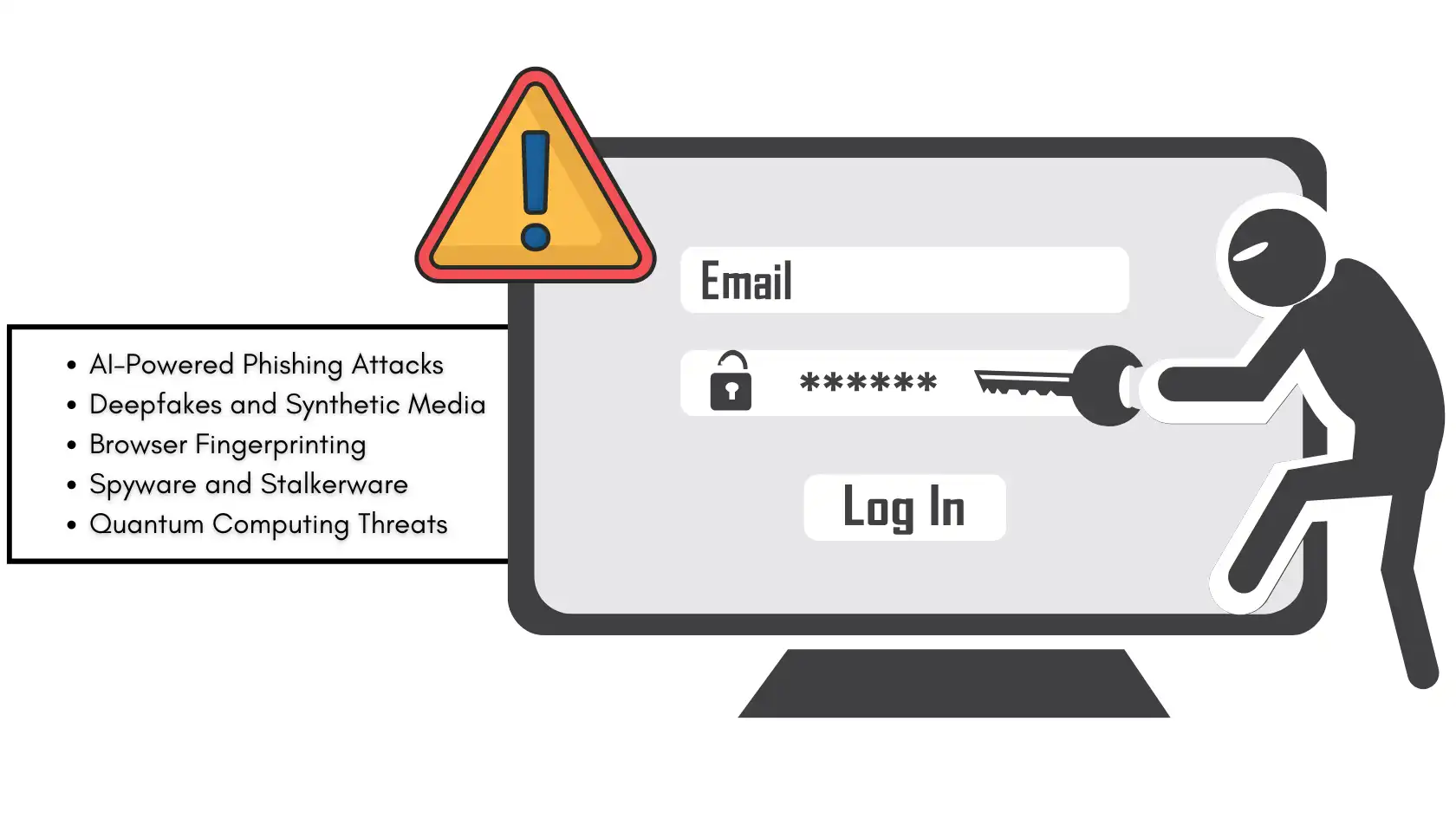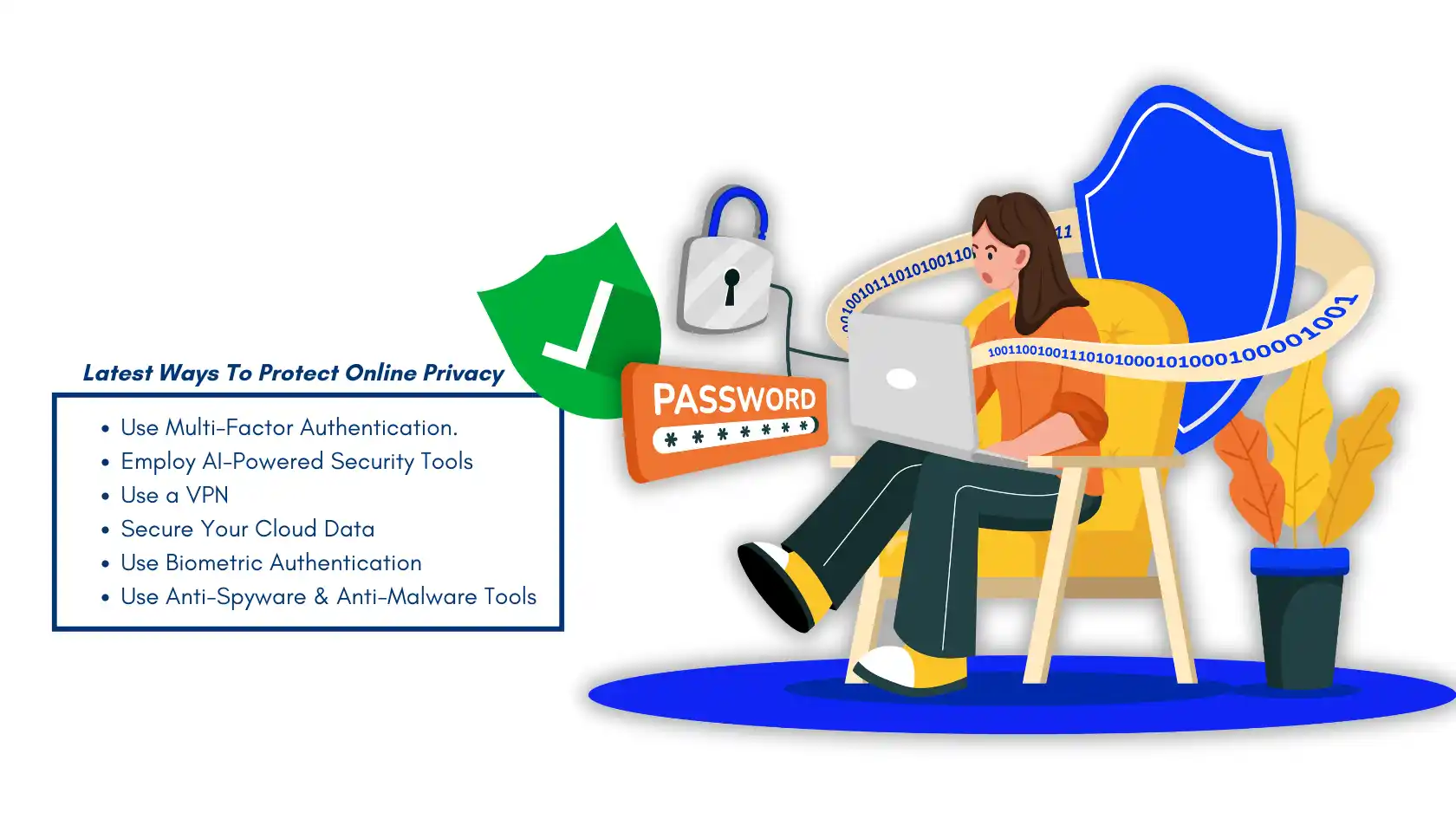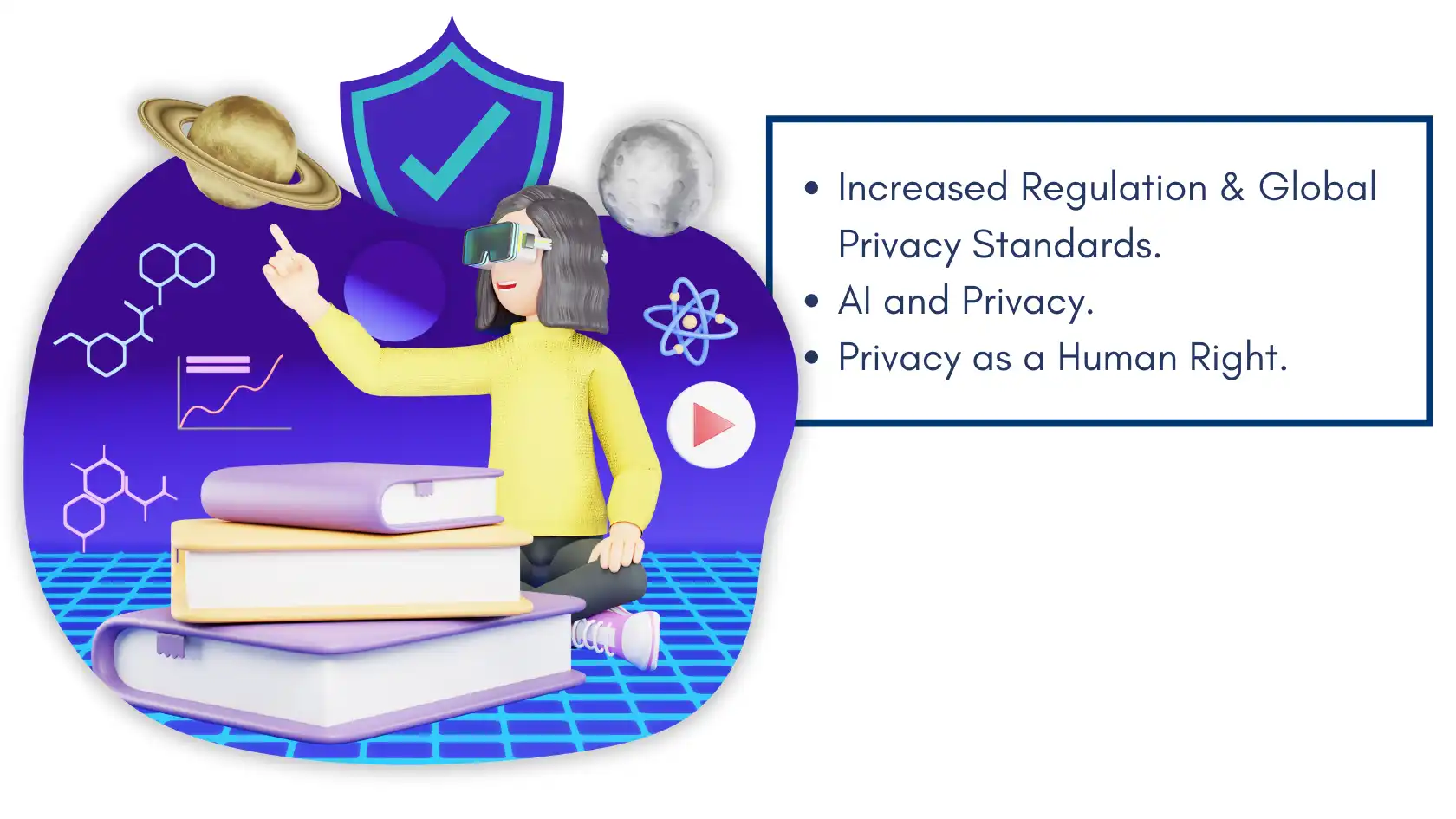How can I keep my personal information safe online?” It is a question we have all asked ourselves at some point. In today’s digital age, where we share so much of our lives online, protecting our privacy has become more important than ever.
We live in a world where our every click, like and share can potentially reveal something about us. From social media posts to online shopping habits, our digital shadow is constantly growing.
But don’t worry, we are not helpless to face these challenges. There are many steps we can take to safeguard our private data and maintain our privacy online.
We will explore what online privacy really means, why it is so important in today’s interconnected world, and most importantly, how protecting online privacy can shield us from threats.
How we can protect ourselves from the threats. We have got you covered with practical tips and strategies on how to protect your online privacy.
So, are you ready to take control of your online privacy? Let us dive right in and discover how we can surf the web safely and more confidently.
What is Online Privacy?

When we speak about online privacy, we mean the security of our private and sensitive information which is on the internet.
This includes your name and email, but also more serious business such as your financial information or things you do online.
Online privacy protection is all about safeguarding your data from the wrong people and keeping control over which players get access to this information and what they might do with it.
We are habitual of sharing our information online in one way or another with increasing awareness and use for social media, mails and e-commerce.
It will not even take long, our each click, search or share gives out information about us.
Online privacy tries to protect this data from being used incorrectly and providing high secrecy of your personal information.
Why Is Online Privacy Important?
Protection Against Identity Theft: Thefts of identities is the most vital privacy issue which takes place in an online environment. Cybercriminals can attack not only on your money, but they as well may impersonate you to try and open credit accounts or make purchases in your name or even commit crimes. Protecting your online privacy will help reduce the likelihood of identity theft.
Safeguarding Personal Information: Your personal data like your address, contact number, and even searching background could be valuable for third parties. To understand online privacy is crucial, as such data is frequently mined by companies who then sell it to advertisers or use the information involved in order to build profiles, which they later target for advertising.
Maintaining Freedom of Expression: It will empower people in some parts of the world from being watched and censored during their freedom loving moments. Better privacy on the Web will also enable people to post and comment without worrying they might be hunted down by well-paid hackers/haters or even directly monitored by government action.
Avoiding Online Tracking: Websites, social media networks and search engines often track your online activity to provide you with better content advertising. That is very convenient, but it also means that they know what you do online.
Preventing Cyber Attacks: Cybercriminals would always target you by using your private information to engage in serious cyber attacks like phishing where they deceive you into revealing sensitive information like passwords or credit card numbers. To reduce the risk of becoming a victim to such a type of attack, you should maintain strong online privacy methods.
Building Trust in Digital Interactions: Trust is a very important part of our lives. Our world has more and more digital access than human facing still building that trust component digitally remains intricate as well. Good online privacy habits by businesses and people keep the world a safer place by providing digital transactions amongst other things. This confidence is important for e-commerce, online services and social media to continue prospering.
So, remember online privacy is and can protect your identity, it helps you to stay secure and prevent malware from entering into everything. By taking important measures to protect your online security, the most critical threats related to these times of information and technology can be prevented.

- Lightning-fast speeds to browse without lag
- Servers in 105+ countries around the globe
- Military-grade security to stay safe online
- Try it risk-free with its money-back guarantee
- Native apps for all major devices
What Are The New Threats To Your Online Privacy?

As we progress into [year], the threats to online privacy are evolving alongside technological advancements.
And cybercriminals are designing complex tactics. Let us look at some of the latest threats to your online privacy:
AI-Powered Phishing Attacks
Cybercriminals have started using Artificial Intelligence or AI for stronger phishing attacks.
CrowdStrike calls out that these AI-pushed phishing emails, texts, and messages look more legit because AI and its role in cybersecurity can accurately replicate normal language.
AI too, makes it easier to change attacks according to how the target behaves online.
Deepfakes and Synthetic Media
The ultra-realistic fake videos and audio made using AI are known as deepfakes. And they are getting ever more sophisticated.
These deep fakes can be used to blackmail or damage reputations. Deepfakes threaten your privacy and security, by hiding between content that is nearly identical to real.
Invasive Data Collection
Many apps and websites still gather huge amounts of personal information, sometimes without you realizing or having a proper opportunity to consent.
This data is mostly sold to third parties or turned into highly detailed profiles for targeting advertisements. The arrival of IoT devices has further expanded the limit for data collection.
Location Tracking and Geofencing
These days location-based services are also being used much more extensively to trace the movements of everyone.
Devices that use GPS will track your location and tally this data to create a picture of where you are each second, day after day.
Geofencing, the creation of virtual boundaries around real world locations that either expose you to desired content or surveillance based on your physical location.
Browser Fingerprinting
Staying in Incognito mode and deleting cookies will not let you escape this. Browser Fingerprinting gets back details about your device, browser settings and other attributes to form a distinctive profile.
It can then be used by the website owners to analyze your online behavior on clear websites. Unfortunately, this method is becoming more and more popular with advertisers and trackers so it is harder to escape.
Social Engineering and Human Hacking
Cybercriminals are becoming better at playing on human emotions as they are able to get more sensitive data.
Social engineering tactics, such as some pretending to be someone you trust, to get personal information and/or breach into secured systems.
These attacks happen through Email, Phishing, Phone calls and social media.
Cloud Security Vulnerabilities
As more data is being kept in cloud storage, the security of cloud and where you keep your personal information becomes even more important.
Cloud security weaknesses can result in massive data breaches, large amounts of financial records, personal photos and even intimate communications have already been exposed.
Although cloud services claim secure environments, they are still a target for advanced cyberattacks.
Spyware and Stalkerware
Spyware and stalkerware are varieties of malicious software or malware, that can be installed on most devices or even cloud services to either gather data from a selected transmitter.
Impersonate them through SMS messages, intercept device connection information leading for access permissions and by changing the default settings.
They monitor your hotkeys, location and browsing activity. It is often used in domestic abuse or corporate espionage, posing a very high risk of privacy.
Quantum Computing Threats
Online privacy will also be a future victim, as quantum computing is in its growing stage. And when it is fully operational, quantum computers could possibly break the encryption techniques basically designed today to protect online data.
Government Surveillance and Data Harvesting
In some places, government surveillance is increasing with agencies collecting impossibly large quantities of data on citizens without their knowledge.
This data can enable surveillance, control or crushing populations. There is even more fear in countries with strict privacy laws and technology companies entering into political alliances.
There are reports of misuse of a security gap only to provide governments access to your information.
To sum up, this means that threats to your online privacy are growing increasingly smooth and widespread along with the development of technology.
To take care of those who want to harm your online privacy will involve a mix of keeping up with the latest threats and taking protective measures.
What Are The Latest Ways To Protect Your Online Privacy?

Protecting yourself from the latest online privacy threats requires a combination of active practices, using the right tools and staying informed about the threats. Here are the most up-to-date ways to protect yourself in [year]:
Use Multi-Factor Authentication (MFA)
Multi-Factor Authentication is an added security feature that asks for more than just your password to log in into accounts, emphasizing the need to make sturdy passwords.
This is typically something you know like a pin, something you have or something that identifies you as a person. That could be biometric data like fingerprints or facial recognition.
When MFA is enabled, you can rest assured that nothing unauthorized gets through even if your password falls into wrong hands.
Employ AI-Powered Security Tools
As AI threats continue to grow, it is important that we use the power of artificial intelligence in security tools as well.
These tools look at patterns and behaviors to detect ongoing threats from the likes of AI-enabled phishing or deepfake scams, enabling teams to take immediate action.
Regularly Update Your Software and Devices
Keep all of your software and devices up to date. The most common reason is that software updates contain patches for security weaknesses where cybercriminals can inject malware.
Use automatic updates if you can to make sure that your software stays protected and set it up so that updating shouldn’t require any extra attention from you.
Use Privacy-Focused Browsers and Extensions
Use privacy-focused browsers such as Brave or Firefox. Also install browser extensions such as uBlock Origin, Privacy Badger and HTTPS Everywhere to block trackers & ads and secure your connections.
You should also use a browser already equipped with anti-fingerprinting measures to protect yourself against the perils of fingerprint tracking.
Use a VPN (Virtual Private Network)
Just so you know, a good VPN will encrypt your internet connection which means it makes all of the data transferred between your device and servers unreadable to hackers, advertisers or even your ISP.
This is very important especially when you are using public WIFI as your data can easily be stopped.
Enable End-to-End Encryption
Signal or Whatsapp, both are two famous names for end-to-end encryption in the messaging app.
End-to-end encryption comes in handy because only you and your contact will be able to read the messages without being intercepted by any third parties, including the service provider.
Secure Your Cloud Data
If you are storing data in the Cloud, it must be encrypted during transit and at rest.
There are Cloud providers that offer client-side encryption to encrypt your files before they leave your device and only you hold the keys.
Keep the sensitive information away from the cloud if possible.
Good Passwords Practices
You should create unique passwords and use them for each different account. Managing all the passwords will be challenging.
For that use a password manager like LastPass, 1Password or Bitwarden to create and store the complicated passwords. Change passwords every now and then, especially in the case of a known breach.
Limit Data Sharing on Social Media
Watch your social presence as well. There could be the very information needed to launch a targeted attack against you and create an extensive profile on just about anyone.
Privacy settings also allow you to limit who can view your information. Never give out personal details such as address, phone number or location on social media.
Use Biometric Authentication
If you use biometric authentication like fingerprint and face recognition, make sure it has a secure implementation on your device.
Consider using hardware-backed security processes, such as Apple’s Secure Enclave or Android’s TEEs that segment and protect biometric information.
Regularly Monitor Your Online Accounts
Keep an eye on your bank statements, credit report and online accounts regularly for anything unusual.
If something seems strange, inform your bank about that fact straight away.
Set up alerts wherever you can, so that if a new login or account alteration occurs then you are informed about it.
Educate Yourself on Social Engineering Tactics
Educate yourself on the common social engineering methods that are used, things like phishing, pretexting or baiting.
Be aware of unrequested communication asking for your personal information or you to click a link or open an attachment.
Go for Privacy-Focused Search Engines
Try using privacy focused search engines like DuckDuckGo or Startpage. This makes sure the privacy of what you search and less information being sold to advertisers.
Use Anti-Spyware and Anti-Malware Tools
You can install an effective anti-spyware and anti-malware software program that detects malicious programs on your devices, as well eliminate the ones located in it.
You can avoid some of your activities from being spied on using spyware or stalkerware by performing regular scans.
Encrypt Your Communications
For communication use protective tools of encryption with urgency. When it comes to emails, you can choose services like ProtonMail or add encryption using tools such as GPG.
When sharing files, then you should consider using a service that provides end-to-end encryption or simply encrypting the file before you send it.
By taking these steps and being aware of the new threats you can make sure that you have a much less high chance of getting compromised by the latest privacy malwares.

Uninterrupted, high-speed browsing, zero logs so your online activity is always private.
Over 7000 people checked out NordVPN in the last month
The Future of Online Privacy

The future of online privacy is a complicated one and it is constantly evolving with new technology and laws to keep it in check as people are becoming more informed about their rights.
As we push deeper and deeper into the digital age, online privacy will remain a major topic with large implications for both users and businesses as well.
Increased Regulation and Global Privacy Standards
As concerns about data privacy grow, more countries are likely to adopt comprehensive data protection regulations like GDPR.
These laws will set a new standard for how companies collect, store and use personal information. Also chaining them down with restrictions for putting more power in the hands of each user.
We might also see attempts to create international standards on privacy, meaning data flows across boundaries in a compliant manner.
AI and Privacy: A Double-Edged Sword
Online privacy will face challenges and benefits of AI. AI enables better security, smarter threat detection and faster breach responses, but on the other side it accelerates privacy compliance enforcement.
But again, the capability for AI to make large-scale linkages of data and draw inferences about behavior could create more extensive surveillance and profiling.
This will inevitably involve a balancing of the advantages provided by AI with individual privacy, possibly through ethical guidelines and governance frameworks in AI.
Consumer Demand for Privacy-Centric Products
As public awareness on privacy issues increases, users make stronger demands that products and services respect their privacy.
Companies that fail to address these concerns will risk losing trust and business.
This shift in user behavior will drive the development of privacy-focused technologies, such as secure messaging apps, privacy-focused browsers and encrypted cloud services.
Increased Surveillance and the Battle for Privacy
While privacy-enhancing technologies and regulations will advance, so too will surveillance technologies.
Governments and corporations may continue to develop and deploy sophisticated surveillance tools, including AI-driven facial recognition, drones, and pervasive monitoring of online activity.
The tension between the need for security and the right to privacy will shape public policy and societal norms, potentially leading to new privacy rights and protections.
As much as privacy-enhancing technologies and regulations grow, surveillance technologies will likewise progress.
Governments and corporations will feel free to build more such tools, like constantly surveilling drones where facial recognition becomes base-level functionality of modern societies.
Battles between security demands and user privacy will affect policy making for new rights on protecting personal information.
Privacy as a Human Right
Privacy may become more recognized as a human right. It is crucial for the protection and enjoyment of other rights, including free speech or association.
This recognition might mean a more robust legal protection or it could simply be an accountability issue for privacy wrongs.
But international organizations and civil society groups will have to take on a critical role when it comes to protecting privacy rights and pushing back against practices which violate these.
FAQs
What are the ways to protect your privacy online?
Can you protect yourself online?
How can you protect yourself as an online user?
How do you protect your online identity?
What are 3 safety tips for Internet privacy?
- Use a VPN to secure your connection.
- Be cautious with public Wi-Fi.
- Regularly update your passwords and use a password manager.
Conclusion
We have seen that protecting our online privacy isn’t just about avoiding annoying ads or keeping our browsing history secret. It is about safeguarding our identities, our financial security and our personal freedom in the digital world.
We have covered a lot of ground, from understanding the latest threats to our online privacy to exploring cutting-edge ways to protect ourselves.
Remember, it is not about becoming a cybersecurity expert overnight. It is about taking small and consistent steps to protect online privacy and make it a priority in your digital lives.
Whether it is using a VPN, being more cautious about what we share on social media or staying informed about the latest privacy-enhancing technologies. Every action we take adds to a safer online experience for ourselves and others.
The future of online privacy may seem uncertain, with new challenges emerging all the time. But by staying informed, using the right tools and making smart choices, we can navigate this digital landscape with confidence. Stay safe out there and happy surfing.






